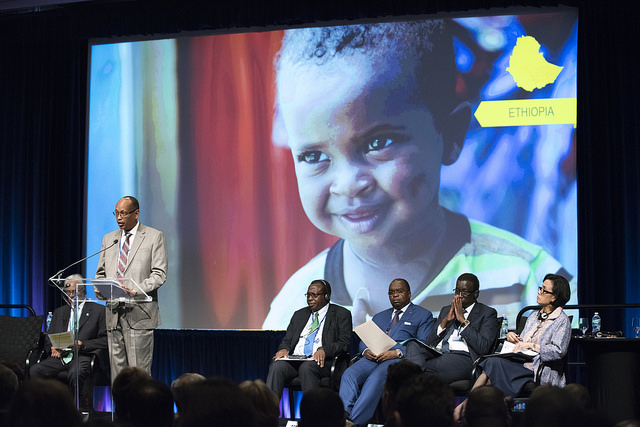At Human Capital Summit, Global Financing Facility Highlighted as Key Partnership for Scaling up Investments in Early Years of Life
— World Bank (@WorldBank) October 6, 2016
The importance of investing in the early years of a child’s life took center stage at the IMF-World Bank Group Annual Meetings on October 6, 2016. During the Human Capital Summit, Heads of State, Ministers of Finance and other officials from eight countries, along with Jim Yong Kim, the President of the World Bank Group, emphasized the importance of investing in the early years as a key driver of economic growth and competitiveness, and shared their plans to accelerate progress to reduce chronic malnutrition in children and expand access to early child development services by 2020.
Along with partnerships like the Power of Nutrition, Scaling Up Nutrition and the Early Childhood Development Action Network, the Global Financing Facility (GFF) in support of Every Woman Every Child is contributing to scaling up key nutrition and other life-saving interventions to give children a better start in life.
“Through IDA and the Global Financing Facility, we will do everything we can to make sure that every country has the resources and technical assistance needed to really tackle this problem,” World Bank Group President Jim Yong Kim said at the summit.
To all leaders: unlocking the potential of children is not only great for your country, but also for the world. -@JimYongKim #EarlyYears pic.twitter.com/vAX8XsO1EZ
— World Bank (@WorldBank) October 6, 2016
Sixteen GFF countries are leading the way to invest in children. One of these countries is Cameroon. During the Human Capital Summit, Louis Motazé, the Minister of Economy, Planning and Regional Development for Cameroon, described how fragility has contributed to under-five mortality and chronic malnutrition, which are undermining children’s physical and intellectual development.To address these challenges, Cameroon is investing in reducing the prevalence of childhood malnutrition through its work with the GFF, “which has already allowed us to mobilize the government and its partners around [the] areas of health and nutrition of mothers and children, and the creation of a multi-sectoral coordination unit for these activities,” Minister Motazé said at the summit. Cameroon’s goal is to reduce the chronic malnutrition rate among under-fives from 32% to 25% by 2019.
 Photo: Nicholas Karlin / World Bank
Photo: Nicholas Karlin / World Bank
The GFF invests in high-impact interventions to scale across the reproductive, maternal, newborn, child and adolescent health and nutrition continuum. Nutrition is essential at each critical stage of the life cycle, especially around birth and the early years. Early childhood experiences have a profound impact on brain development, affecting learning, health, behavior and adult income—but 90% of this development occurs before the age of five. Investing early pays dividends: According to the World Bank, the per capita income penalty country incurs for not eliminating stunting is 6% on average, while Sub-Saharan Africa and South Asia incur penalties of about 8% of GDP per capita.
The Lancet recently released a series of research papers on early childhood development that found that children suffered lifelong disadvantages from poverty and stunting and that these children faced an average 26% loss of adult income per year. Investing in healthy mothers, exclusive breastfeeding and proper feeding are three important places to start. The GFF is ensuring that mothers-to-be, mothers and children access high-quality health and reproductive services that enable a healthy, safe and planned pregnancy, delivery, and post-natal care, and well-child care (Read: Breastfeeding: A Smart Investment for Reaching the Sustainable Development Goals). By supporting countries through targeted and innovative investments in nutrition, the GFF contributes to the goal of reducing chronic malnutrition in children and expanding access to early childhood development services by 2020 (Read: GFF Nutrition Fact Sheet).
The Human Capital Summit occurred just two weeks after the launch of the report, The Global Financing Facility: Country-Powered Investments for Every Woman, Every Child, which includes 31 contributions by heads of state, agencies, international organizations, companies, civil society organizations and partnerships, which confirms the highest and broadest support for the GFF. At the launch, World Bank Group President Jim Yong Kim also announced that the GFF now was reaching 16 countries, including new additions Guinea, Myanmar, Sierra Leone and Guatemala—a country that has strongly committed to investing in nutrition.